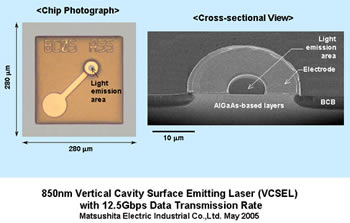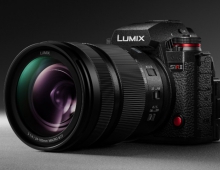
Panasonic Develops VCSEL Laser with 12Gbps Data Transmission Rate
Panasonic today announced the development of the 850 nm AlGaAs/GaAs VCSEL (Vertical Cavity
Surface Emitting Laser) capable of high speed 12.5 Gbps modulation at low operating current of 8 mA.
This laser will be used for a low-cost optical communication such as plastic fiber communication and
spatial light transmission.
For high-speed operation, it is essential to reduce the parasitic capacitance in the laser. The developedVCSEL has Panasonic's original planarized structure using BCB (benzocyclobutene) resin with low dielectric constant formed around the light emitting post structure. This structure hugely reduces the parasitic capacitance to less than one third of the conventional value from 0.7 pF to 0.2 pF. This allows doubling the modulation bandwidth previously limited by the parasitic capacitance, realizing the world's highest data transmission rate of 12.5Gbps with 12 GHz relaxation oscillation frequency.

In addition, the optimization of the device structure employing current confinement by selective oxidation has realized a low threshold current of 1 mA, a high slope efficiency of 1.1 W/A that is almost three times higher than the conventional value, according to the company. This has resulted in a low operating current of 8mA for 12.5Gbps modulation.
Panasonic aims to begin shipping the two types of surface emitting lasers (2.5 Gbps and 12.5 Gbps) in early 2006. Applications for forty Japanese and nine international patents have been filed. These research and development results have been presented at Conference on Lasers and Electro-Optics (CLEO) 2005, held in Baltimore, U.S. from May 22 to 27, 2005.
For high-speed operation, it is essential to reduce the parasitic capacitance in the laser. The developedVCSEL has Panasonic's original planarized structure using BCB (benzocyclobutene) resin with low dielectric constant formed around the light emitting post structure. This structure hugely reduces the parasitic capacitance to less than one third of the conventional value from 0.7 pF to 0.2 pF. This allows doubling the modulation bandwidth previously limited by the parasitic capacitance, realizing the world's highest data transmission rate of 12.5Gbps with 12 GHz relaxation oscillation frequency.

In addition, the optimization of the device structure employing current confinement by selective oxidation has realized a low threshold current of 1 mA, a high slope efficiency of 1.1 W/A that is almost three times higher than the conventional value, according to the company. This has resulted in a low operating current of 8mA for 12.5Gbps modulation.
Panasonic aims to begin shipping the two types of surface emitting lasers (2.5 Gbps and 12.5 Gbps) in early 2006. Applications for forty Japanese and nine international patents have been filed. These research and development results have been presented at Conference on Lasers and Electro-Optics (CLEO) 2005, held in Baltimore, U.S. from May 22 to 27, 2005.





















